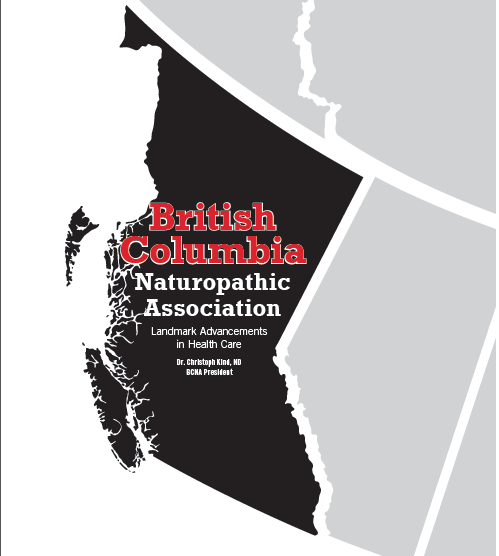British Columbia
Naturopathic Association Landmark Advancements in Health Care
In the fall of 2010 British Columbia’s healthcare services took a profound leap forward: Licensed naturopathic physicians, who chose to obtain prescribing authority, were granted access to a wide range of therapeutics previously limited by prescription. is enhanced the existing care NDs currently provide while improving primary care options for patients across the province.
It was a pivotal moment for the profession and by extension provincial healthcare in general. While recent decisions by the ministry of health have put more value on and better recognized the legitimate scope of naturopathic practice, they have been a long time coming in British Columbia. Although licensed as doctors in the province since 1923, originally in an omnibus bill encompassing “allopaths, naturopaths and osteopaths,” it was 1936 when distinct legislation for naturopathic physicians was formally passed. Since then, however, many traditional medicines previously available to NDs, as well as the ability to compound and prescribe, have gradually and increasingly become limited. It was 1958 when the provincial government established a legislative mandate to enact a defi ned schedule of preparations for licensed NDs. But that commitment lagged in legislative limbo for many years, despite a formal “materia medica” being completed in 1979 and a tentative commitment to act on the mandate at the start of the 1990s.
It took decades to weather these many setbacks, along with the focussed determination and dedication of a huge number of physicians, and the support of many others through letters, meetings, presentations, solicitation and eventually even public outcry, to bring the issue to the fore.
Despite a tentative commitment to move forward as mentioned, a major stumbling block occurred in the 1990s when the NDP government initiated a legislative and scope of practice review process for all heath professions. is stalled all scope issues for six years. And, despite years of negotiation and volumes of correspondence, as well as a forward-leaning preliminary report, the end result was a huge setback. e fi nal report in 2001 nearly derailed the profession with stagnant, uninformed views on integrative care with no substantive reasoning for its regressive tone. We were fortunate that with the support of our patients, and with the extensive research collated during the review years, we had a strong case to move forward on scope issues and to question the review process and outcome. An independent health audit was commissioned by the ministry to more fully examine these outstanding issues and, in late 2004, the Naturopathic Scope of Practice Gap Analysis was completed. Ultimately, the initial scope review of naturopathic medicine was found lacking; once that was clearly established, we were able to meet with ministry offi cials, outline the historical and contemporary practice of naturopathic physicians, and work cooperatively to achieve a practice status commensurate with the education, training and expertise of our members. At the same time the existing Liberal government also began holding its “Conversation on Health Care” meetings across the province. Overwhelmingly British Columbians expressed their desire for choice and meaningful access to complementary and preventive health care. is culminated in a rone Speech commitment in 2008 whereby the government made clear its support and committed to steps to recognize the value of naturopathic medicine in the province and bring resolution to what had been in limbo for decades.
It would be impossible to individually thank the people who collectively brought us to this significant turning point: The doctors who so tirelessly campaigned during the 1970-80s when the profession was but a few dozen strong; those who contributed to research, writing, meeting and speaking before ministers, panels and bureaucrats; and the many directors over the years who built on the efforts of those before them. It is most important, however, to note that without the concerted and combined efforts of both our professional and regulatory associations to advance the profession, our efforts would have been in vain.
From the BCNA perspective, it was unfortunate we had to argue so persuasively to obtain access to many botanical medicines, natural therapeutics and other traditional items which, over time, had become scheduled and therefore inaccessible to NDs. However, most positively, this protracted negotiation gave opportunity and allowed for the significant enlightenment and education of politicians, staff and other health professionals on the education and training of NDs and the substantial contribution NDs make to health care in the province. Underscoring how prevention and treatment of physical and mental disease, disorders and conditions is at the heart of primary care, and of course the extensive nature of naturopathic care was actually a revelation to many! It was also a complex issue to explain that NDs would be offering prescriptions when appropriate, that access to drugs wasn’t about a departure from current practice but more a reflection of the expertise of naturopathic physicians and streamlining their delivery of primary care. Most importantly, an appropriately certified naturopathic physician may now have full access to the natural medicines previously held behind locked doors but used so safely and effectively for so many years in the past. Now, delivery of healthcare is also made simpler for any patient who may require a so-called drug medication but seeks primary care from an ND because they do not have to make additional trips to other providers. For patients seeking non-drug alternatives, the ND can legitimately adjust, if appropriate, drug regimens while introducing non-drug therapies. In a sense, the ability to prescribe legitimizes the decision not to prescribe.
Another key point in the process to a change in legislation was emphasizing that the status quo was confusing to the patient and led to unacceptable discrepancies in care. Without access to pharmaceuticals, when necessary, members are often in a position of ambiguity. There can even be an inherent danger to the public and the profession; for example, in a case such as bronchial pneumonia, where the ND deems antibiotics are required in the short term, yet cannot prescribe them, this unreasonably constrains care. It also places the patient at risk due to delays in appropriate care. And, for patients who had seen an ND in US jurisdictions where NDs have long had the authority to prescribe scheduled medicines routinely, it was often discouraging and confusing for them to receive care here.
For many decades BC’s naturopathic physicians have been seeking from government recognition for a scope of practice in keeping with the contemporary and historical practice of licensed NDs. In the 2008 Throne Speech the BC Liberals made a commitment to proceed with two facets of naturopathic medical care: Prescriptive rights and diagnostic facility access. The process leading to this announcement involved many years of negotiation, research, and collaborative assessment. The government’s commitment was based on this lengthy and detailed process; it was a commitment based on sound judgement having reviewed the educational criteria, current and historical practice of NDs, and, most importantly, ensuring the highest levels of patient-centred healthcare are available to all British Columbians. The BCNA believes that this commitment is the right choice for British Columbians: It reduces the existing burden on MDs while ensuring the provision of safe and effective primary healthcare in a measured fashion.
It also came as a surprise to many in government and even other health professionals that in fact not every prescription was a drug. For example, high dose vitamins, some amino acids, hormones, botanicals and herbs (which NDs have used for decades) had slowly become “scheduled” without legal access to non-prescribers. This element of moving forward was emphasizing the evolving art of medicine. Bureaucrats never questioned advances in drug therapy or technology for MDs—but initially questioned the need for such changes with NDs. Addressing this objectionable double-standard was another obstacle on the route to legislative advancements.
Further, it was often a difficult task to explain that changes to scope of practice weren’t about vested interest but about the patient’s interest. The BCNA’s Four Point Plan is based on improving safe, effective, economical preventative healthcare. It was disingenuous for the government to assume that NDs don’t deal with drugs on a daily basis. Primary care by definition involves dealing with patients on a drug regime, considering pharmaceuticals and/or an alternative, drug/non-drug interactions, and myriad other interconnected health issues. Exhaustively detailing and re-emphasizing that NDs don’t practice in a void may seem elementary but was actually critical to moving forward. Further, the ability to prescribe segues with the government model of “shared scopes” of practice. The change also keeps with the long record of safety and effectiveness of naturopathic medicine.
A final key element to moving forward on improvements to scope of practice came in no small part from a government willing to work with us. We have been fortunate in that the Liberal government over the last decade had a commitment to allowing licensed health providers to practice to the full extent of their education and training. That commitment was essential for us to establish dialogue on our Four Point Plan and to improve awareness of the safe, effective, patient-centred health care that is the foundation of naturopathic care. The BCNA’s plan focussed on how NDs can deliver high quality primary health care, reduce duplication and inefficiency and alleviate the shortage of MDs.
Despite this major advancement, the BCNA remains committed to its initial Four Point Plan, three items of which (full diagnostic access, hospital privileges and referrals to specialists) are still to be fully realized. In addition, there is much work to be done with respect to access of federally controlled substances, an issue we are working on with our national association. Still, this landmark in provincial and Canadian healthcare marks a fundamental shift towards better patient options, enhanced choice and true complementary care. We are hopeful this step will lead to improvements in care across the nation.










